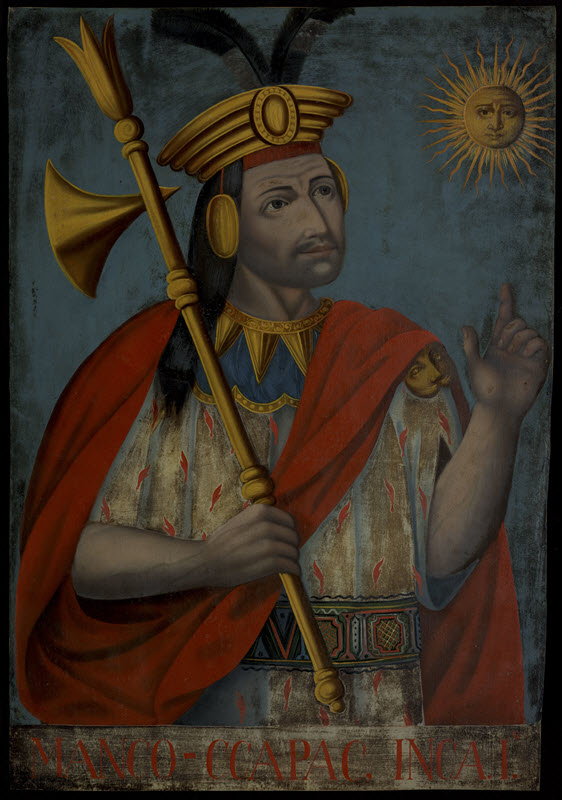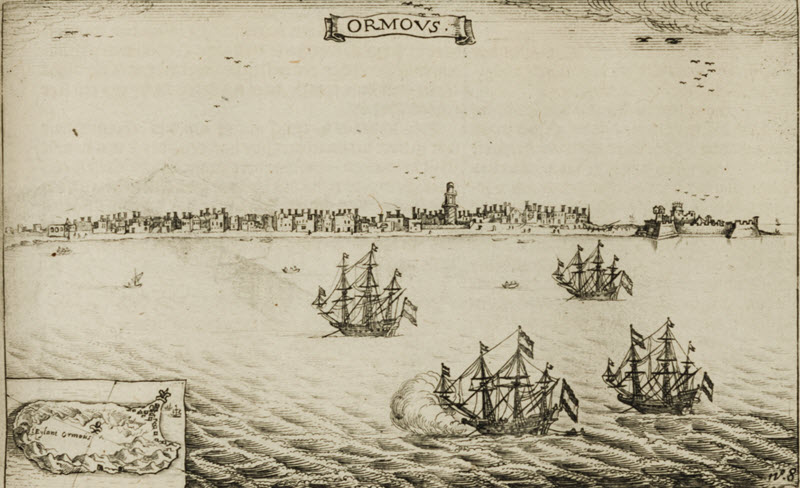1394
Birth of Prince Henry of Portugal, known as 'Henry the Navigator' for his sponsorship of a number of voyages.
Birth of Prince Henry of Portugal, known as 'Henry the Navigator' for his sponsorship of a number of voyages.
The carrack (a multi-masted and high sided sailing vessel) is developed by the Portuguese. The vessel is ideal for sailing in rough seas, making long distance voyages possible.

Bethencowt establishes a European settlement in the Canary Islands.
A Portuguese force captures Ceuta.
Zaro and Teixeira reach Madeira, and claim it for Portugal.
Portuguese planters introduce sugar to Madeira.
Henry the Navigator sends 15 expeditions to explore West Africa. None reach any further than Cape Bojador, just south of the Canaries.
The colonisation of the Azores begins.
The Aztec Empire forges an alliance with nearby city states in Texcoco and Tlacopan.
Cabral claims the Azores for Portugal.
Further Chinese Voyages of Discovery are banned by imperial decree.
Eanes explores the West African coast, almost to the Tropic of Cancer.
Johannes Gutenberg invents a printing press.
Antao Goncalves sails to Cape Bronco in West Africa, and takes two slaves.
Eanes sails to Lagos, and captures 200 African slaves.
Dinis Dias rounds Cape Verde (the western tip of Africa), and opens up trade routes to Timbuktu.
The alphabetic movable type printing press is invented by Johann Gutenberg.
Three Papal decrees officially sanction the slave trade.
Gutenberg prints the 42-line Bible in Mainz, marking the beginning of printing in Europe.
Fernão Gomes obtains a lease which guarantees him a monopoly of the Guinea trade to Portugal, and explores and exploits the Guinea coast.
Queen Isabella of Castile marries King Ferdinand of Aragon uniting Spain's two main kingdoms.

The Inca Empire engulfs the nearby Chimu people, extending their influence to Quito in contemporary Ecuador.
Fernão do Pó explores islands in the Gulf of Guinea.
The Portuguese establish a fort on the Gold Coast.
Cão reaches the mouth of the Congo River.
De Paira journeys through Ethiopia in search of Prester John.
Pedro da Covilha is sent by John II of Portugal to explore trade in spices with India. He journeys overland via Alexandria, Cairo and Ormuz. He then completes a second mission to Ethiopia via Mecca and Medina.
Bartholomew Dias rounds Cape of Good Hope.
Martin Behaim constructs the first documented terrestrial globe.

Christopher Columbus leads his first voyage to the Indies, intending to reach Japan by a Western route, reaching the Caribbean.
Columbus' second voyage reaches Leeward Islands, Jamaica, Puerto Rico and Hispaniola.
Columbus brings sugar cane to the Americas, where it grows easily. This marks the foundation of the sugar industries in Jamaica, Haiti and Cuba.
Columbus encounters allspice and chili peppers (capsicums) in the Caribbean.
John and Sabastian Cabot reach Newfoundland in an attempt to find a North-West Passage.
Amerigo Vespucci’s first voyage to New World reaches contemporary Guiana.
Vasco da Gama sails to India, via the Cape of Good Hope and East Africa.
Columbus' third voyage reaches contemporary Trinidad, Tobago, Venezuela and Hispaniola.
Alonso de Ojeda and Amerigo Vespucci sail to South America and explore its northern and eastern Coasts, naming Venezuela after Venice and establishing that South America is a continent.
Pinzón sails along the coast of Guiana and Brazil, encountering the Amazon.

The Second Portuguese India Armada sails under Pedro Alvares Cabral, reaching Porto Seguro, Brazil.
A Portuguese force challenges Arab influence in Mozambique.
Gaspar and Miguel Corte Real sail to Labrador, Newfoundland and Nova Scotia.
João da Nova leads the third Portuguese expedition to India.
Amerigo Vespucci’s third voyage explores the coastline of South America.
Columbus' fourth voyage reaches contemporary Puerto Rico, Hispaniola, Cuba, Nicaragua, Cost Rica and Panama.
Francisco de Almeida is sent on an expedition to build forts, subdue Indian resistance and to displace Arab trade with the Spice Islands and India. Almeida is killed during the expedition.
Martin Waldseemuller publishes a world map, utilising the name 'America' in honour of Amerigo Vespucci, whose (supposed) letters have been circulated in Europe to great acclaim.

Afonso de Albuquerque raids Muscat and captures the fort of Ormuz, which controls traffic into the Persian Gulf.
Amerigo Vespucci is appointed Chief Navigator, charged with organising Spanish voyages to the Indies.
Vicente Pinzon searches for a passage to the East Indies, instead encountering Honduras and Yucatan.
Afonso de Albuquerque replaces Almeida as Governor of the Portuguese Indies, and establishes a Portuguese trading centre at Goa.
Ojeda and Niaiesa found a Spanish settlement in Darien.
Afonso de Albuquerque conquers Malacca on the Malay peninsula, and ascertains the location of the Spice Islands.
Spanish settlers establish coffee, sugar and tobacco plantations on Cuba.
Copernicus publishes his Commentariolus, a heliocentric cosmology.
Pedro Mascarenhas reaches the islands of Diego Garcia and Mauritius.
Antonio de Abreu and Francisco Serrao sail from Malacca to the Spice Islands, trade for nutmeg at the Banda Islands, and establish a fort at Ternate.
Juan Ponce de Leon sails from Puerto Rico, reaches and discovers the Gulf Stream.
Vasco Nunez de Balboa leads a party across the Panama isthmus, and becomes the first European to see the Pacific Ocean.
Jorge Alvarez and Rafael Perestrello sail from Malacca to Canton, China, becoming the first known Europeans to trade there.
Diaz de Solis reaches the mouth of the River Plate.
Captain Fernão Pires de Andrade embarks upon an expedition to China.
A Portuguese factory is founded in Colombo, Ceylon.
Alonso Alvarez de Pineda explores Florida, and reaches the Mississippi River.
Pineda sails from Florida to the border of contemporary Mexico, becoming the first European to visit what is now Texas.

Hernan Cortes travels from Cuba to Mexico, eventually defeating the Aztec civilisation with the assistance of local allies.
The first circumnavigation of the world is completed, initially led by Ferdinand Magellan, and thereafter by Juan Sebastian del Cano after Magellan's death in Mactan.
Cristóvão de Mendonça is thought to have sailed from Portugal to the Pacific, and reached Malacca.
Lope de Siqueira circumnavigates Africa.
Portuguese merchants establish a trading post at Madras.
Francisco de Montejo initiates a 20 year conquest of the remaining independent Mayan cities of the Yucatan.
Pascal de Andagoya carries out a coastal survey of South America, reporting the riches of the Inca civilisation.
Alvarado conquers contemporary Guatemala and El Salvador.
Francisco Pizarro first encounters the Inca Empire.
Petrus Aptanus of Ingolstadt's Cosmographiais published.
The Council of the Indies is established to run Spain's American colonies.
Giovanni da Verrazano leads a French-sponsored expedition to North America, and explores the coastlines of contemporary North Carolina, Maryland and New York.
Garcia Jofre de Loaísa leads an expedition across the Pacific with the intention of colonising the Spice Islands. Only one of seven ships reaches the Spice Islands; the survivors are captured by the Portuguese, and are returned to Spain in 1536.
Pánfilo de Narvaez embarks upon an expedition to explore the interior of Florida.
Cabot sails up the River Plate and other major South American rivers, searching for a route to the Pacific
King Henry VIII of England sponsors the first attempt to reach the North Pole and Northwest Passage under John Rut, who explores contemporary Newfoundland, Maryland and Florida.
Spain concedes its rights in the Spice Islands to Portugal, in return for a cash payment.